So you’re wanting to teach English in Thailand? You’re shopping around to find a program or job that suits you. They all have varying degrees of assistance and inclusions and you probably don’t know what you need to get by in this exciting country. Choosing a program with a cultural orientation included can be an incredibly empowering decision, jump-starting your life in Thailand, ensuring you know the basics to make a success of your adventure. Let’s look at the top 5 reasons how the orientation on our Thai program can help you:
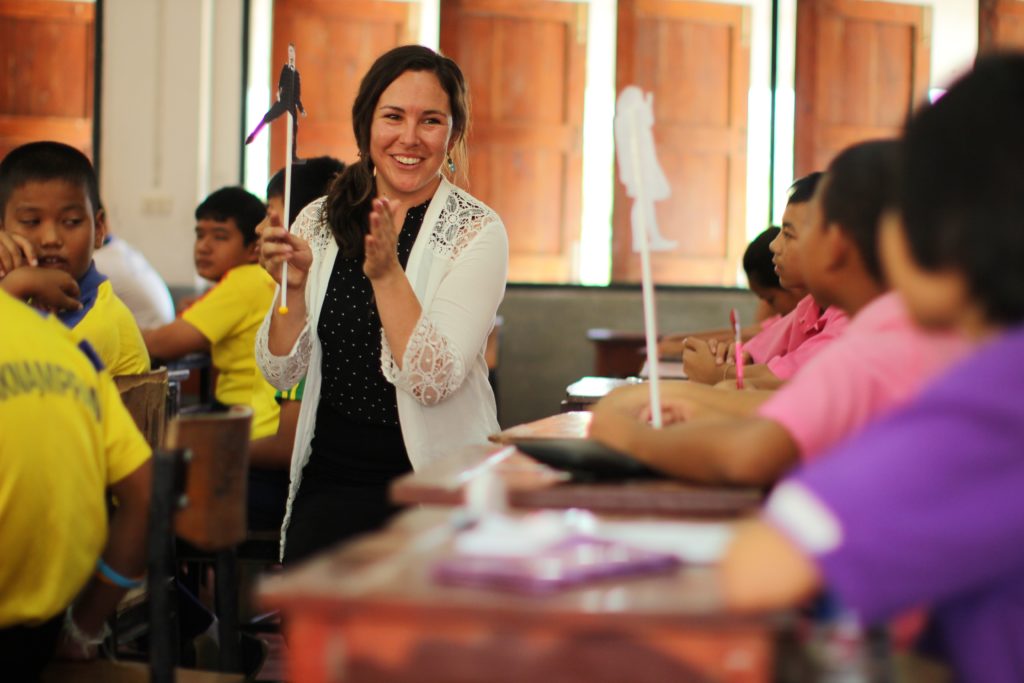
You’ll learn the basics to chatting with the locals
If you haven’t already heard Thai, you’ll quickly learn that it’s a very different language to anything you’ve likely heard before, not only that but it’s written in its own unique script. What’s more is that, you’ve probably guessed it, it’s the main and often only language spoken by Thai people, especially in less urban areas. Luckily with good cultural orientations, they’ll include Thai language lessons to help you master the basics.
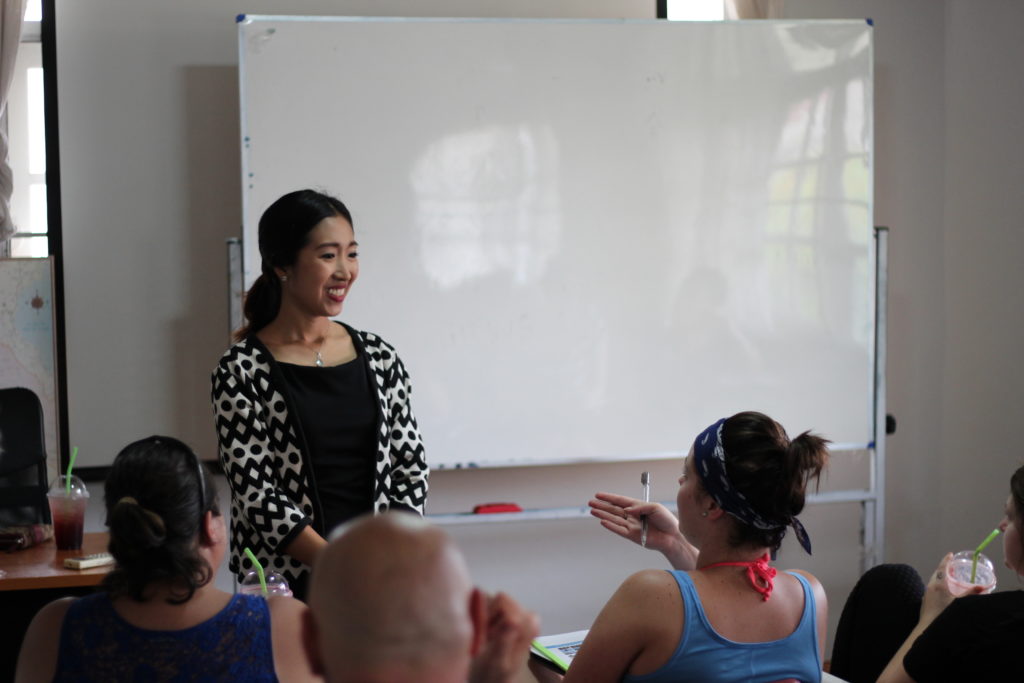
Thai language teacher Pear runs through pronunciation with a soon-to-be English teacher
While they probably won’t go over the complications of the lengthy and ancient alphabet, something you can save for extra lessons on your own time, you’ll quickly learn how to pronounce things correctly (there are 5 tones which can completely change the meaning of any words if mispronounced). You’ll also learn basic phrases and words to show respect to those around you, help you ask for assistance, order food in a restaurant, shop at a market or to get the cooperation of your students. Without this you can be bumbling along yelling in English as you get more and more frustrated and looking like an ‘idiot abroad’, offending old ladies and not winning you any friends.
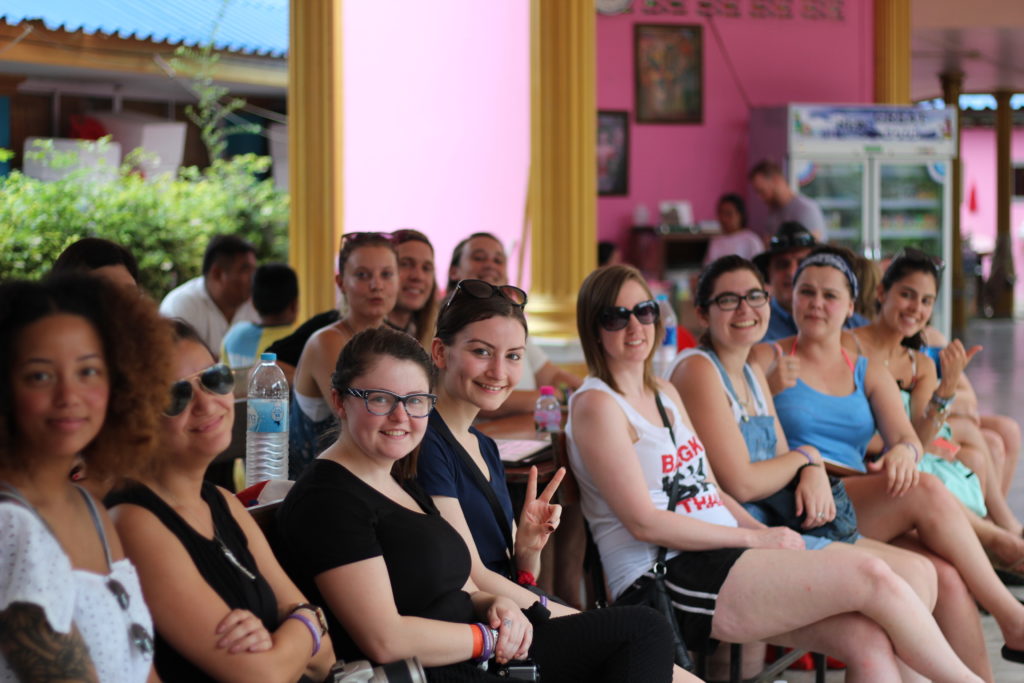
As you’ll quickly learn in Thailand, winning friends is an important part of surviving here.
Avoid foot-in-mouth syndrome with history and culture lessons
Thailand is a country with a long, proud and complicated history. Of course with history comes politics and Thailand isn’t short on this. You’ll learn about its various military dictatorships and bouts of democracy over the years, the highly respected monarchy (it’s illegal to show any disrespect when talking about them) and Thailand’s complex relationship with its neighbors and the world superpowers over the last thousand years. All this helps you understand which topics are taboo and why the people you’ll meet have the worldview they do.
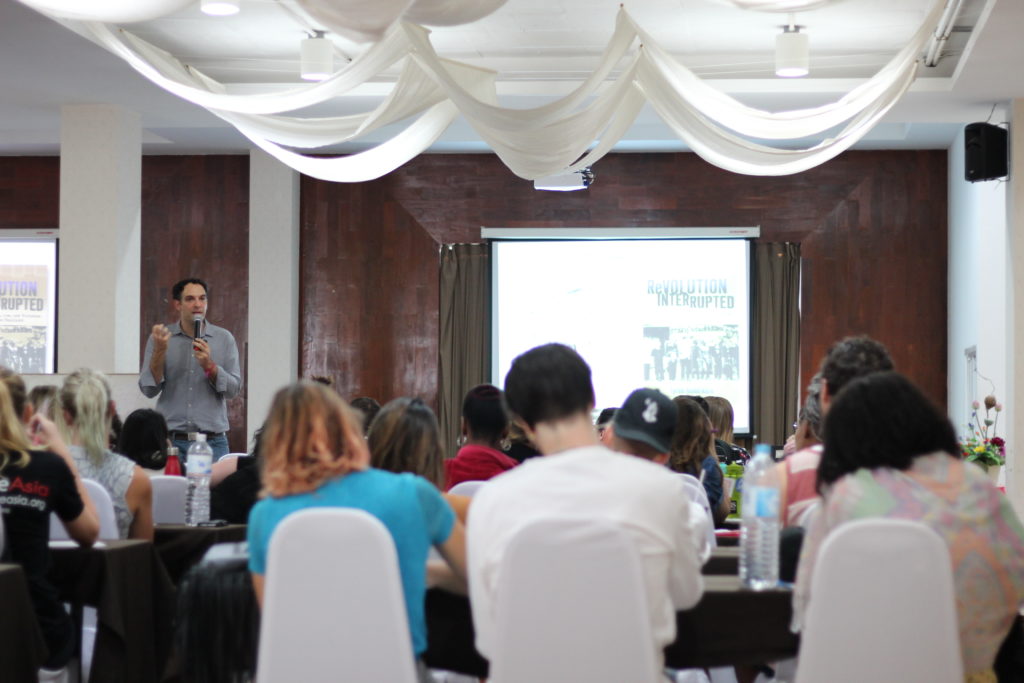
When exploring the culture you’ll learn how never being colonized has shaped the proud Thai identity and kept it somewhat unique and distinct from it’s British and French influenced neighbors. You’ll learn about how Thailand’s collectivist culture differs from western individualist culture and how sharing food and drink is the fastest way to make a new friend. This is all crucial in making sure you’re quickly absorbed into the community in which you’ll live, something which will go a long way to giving you the best experience possible.
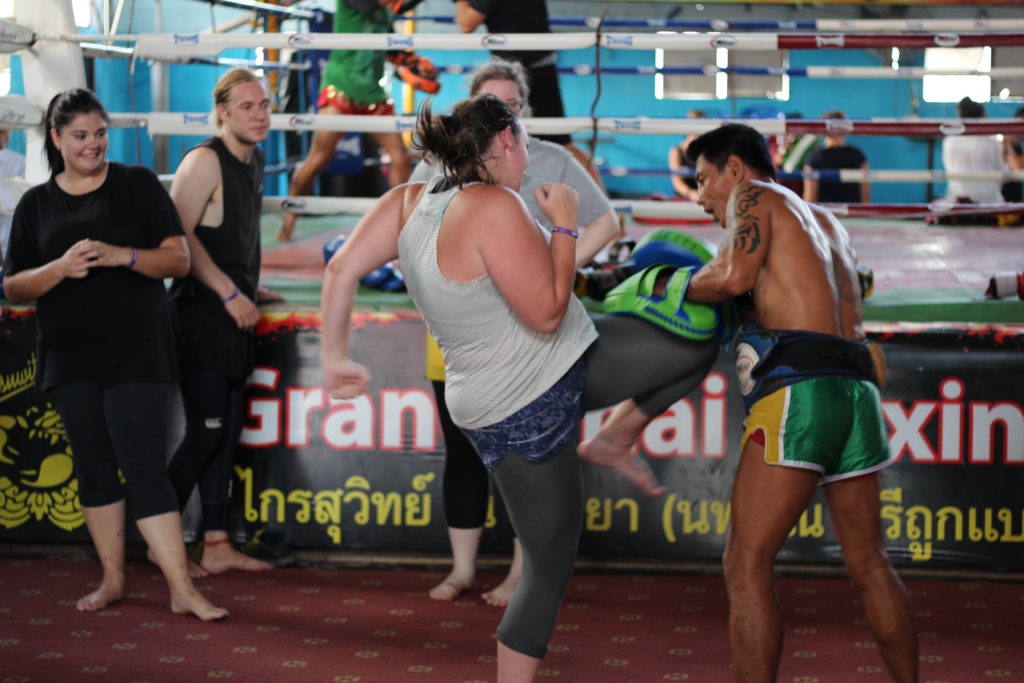
Muay Thai – kickboxing – is an important part of Thai sporting culture and a great way to keep fit!
Get to grips with the food
Eating is done differently in Thailand. Almost everything is fresh, and a lot of the time you’ll simply eat street food or at cheap and cheerful roadside restaurants. If you do decide to cook, often the best and cheapest way of getting fresh produce is to head to your local market. Just to be clear, this isn’t a supermarket, it’s the outdoor kind with trestle tables covered in a vast array of exciting and often exotic fruits and veggies, barbecues grilling all sorts of marinaded meats from whole fish to pork strips, shrimp and chicken.
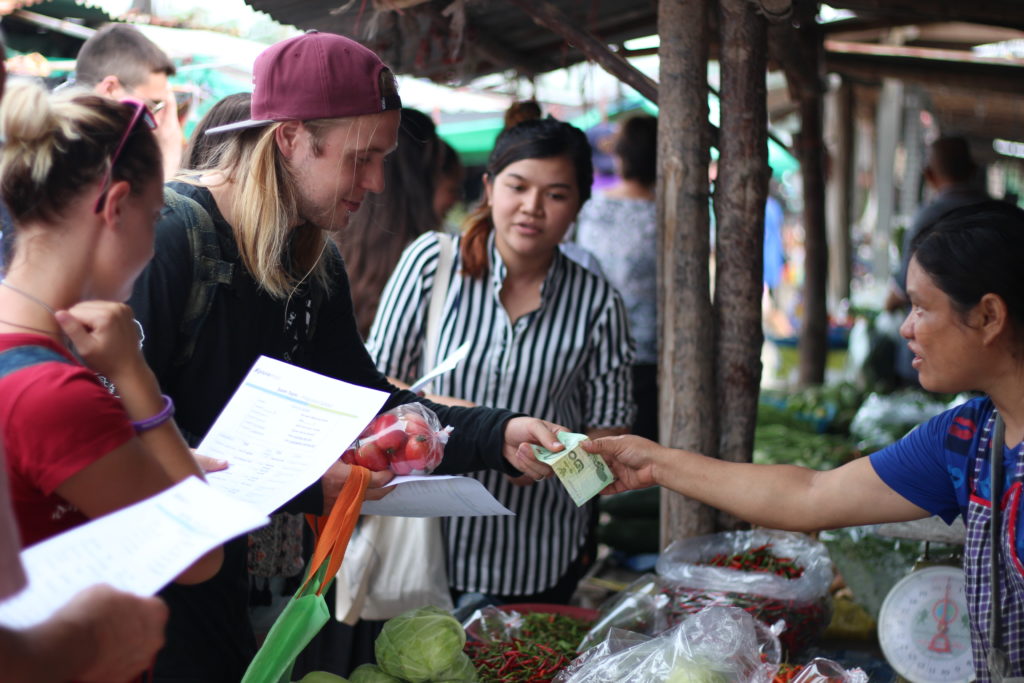
With reputable cultural orientations you’ll be taken through the ins and outs of shopping at a Thai market, from what the strange fruits, meats and snacks are to how to order the ingredients you need for specific dishes.
You’ll also get your chance to learn how to make popular and easy-to-make Thai dishes like spicy papaya salad and pad Thai. Thai food is insanely quick to make but it comes with a dizzying array of ingredients and condiments, which, if you don’t know what you’re doing can turn mild fresh salad into a bowl of molten lava with the one spoonful of the wrong sauce. It pays to know whats what when eating out in South East Asia.
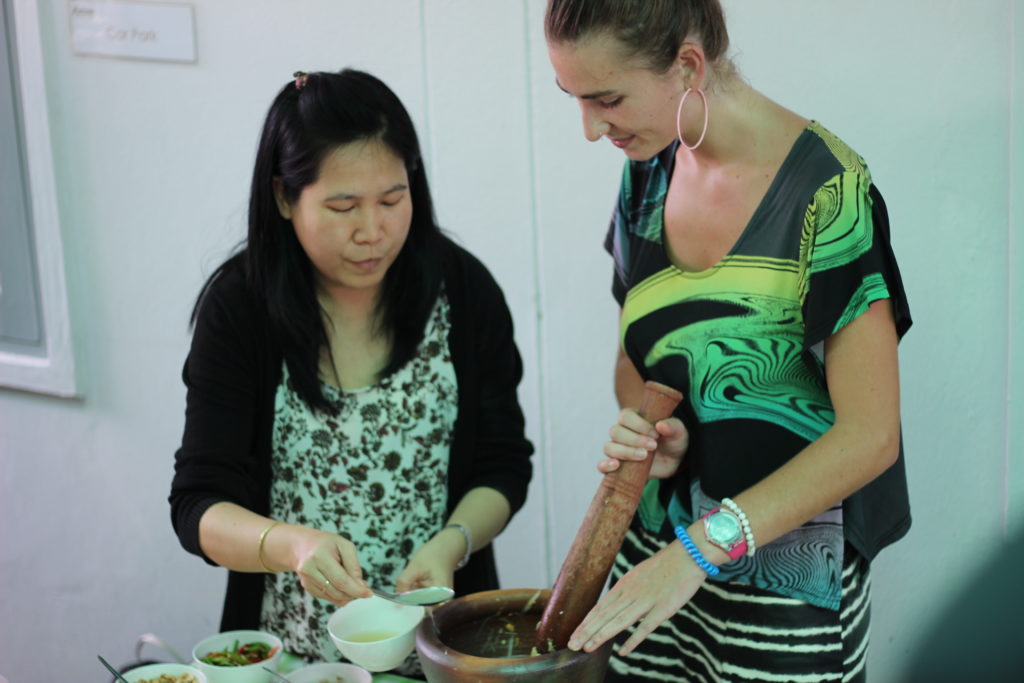
Learning how to make Som Tam Thai, or Green Payapa Salad, a spicy and easy-to-make dish
Learn about generating good karma
Okay, okay, before some of you get all Christopher Hitchens on me, hear me out. In a country where more than 90% of the population are Buddhist, you’ll quickly realize that understanding the religion is going to be important to understanding day-to-day life here. On our cultural orientation you’ll be taken to a local Buddhist temple and led in a meditation session by a monk, you may even receive a blessing! You’ll also get to ask the monk questions about his daily life, his past and his understanding on philosophical concepts – some used to be policemen, businessmen or lawyers before they gave it all up for a life of service and meditation.
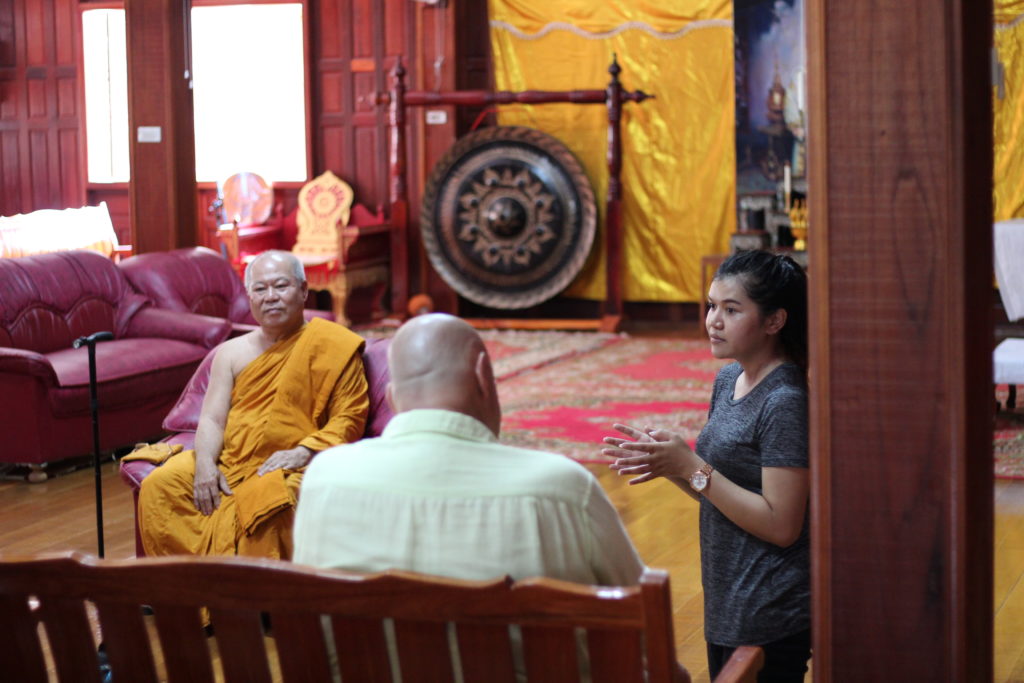
Asking the Bhuddist monk the meaning of all life’s most difficult questions through the interpreter of course
In the Bhuddist spirit of karma, we believe strongly in giving back and on the grounds of the temple visited on our Hua Hin course is a rather special place: a rescue shelter for the city’s many stray dogs (and some cats too!) You’ll get the chance to help walk, bathe and treat these fluffy friends and show them the love they lost out on living on the streets. In a country which prides itself on being respectful, friendly and generous, this is humbling step in launching a rewarding adventure in Thailand.

Because walkies on the beach is the best way to show your love for our furry friends
Make friends to last you a lifetime
A cultural orientation is an amazing way to make some life-long friends from around the world. You all arrive, nervous and excited for what the experience is going to bring and it’s great to be able to share these emotions with people in the same boat. Many of the activities are done in groups too where you solve problems like shopping, speaking the language and getting around together.
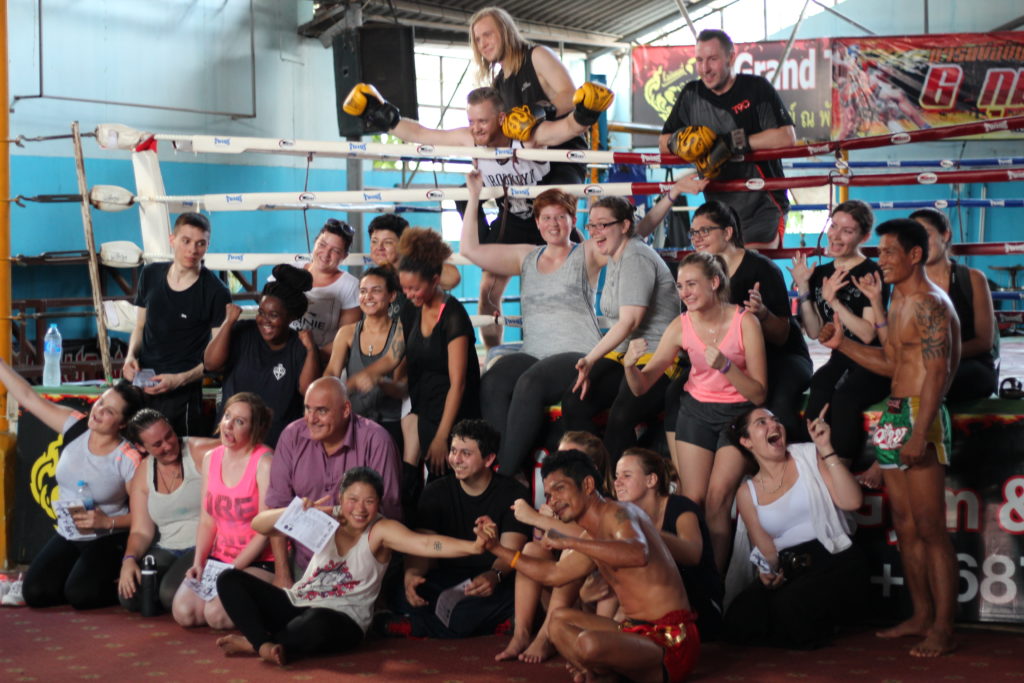
You’ll all have shared in the blood *sweat* and tears of the experiences which brought you together, you’ll find friends for life!
The bonds you form over this time are something invaluable to the rest of your stay in the country. After you’ve received your placements, you’ll be sent off to cities and towns far and wide. Sometimes you may be the only westerner in the town, sometimes you’ll be placed along with one of your newfound friends and having that group of people to draw on for encouragement when you need to ask a question or just get some moral support will make the world of difference to your experience here!
And, when your time has come to return home or move on to working in another country still, it’s those connections who will be there supporting you, understanding you and celebrating your adventures as you each continue down your own paths.
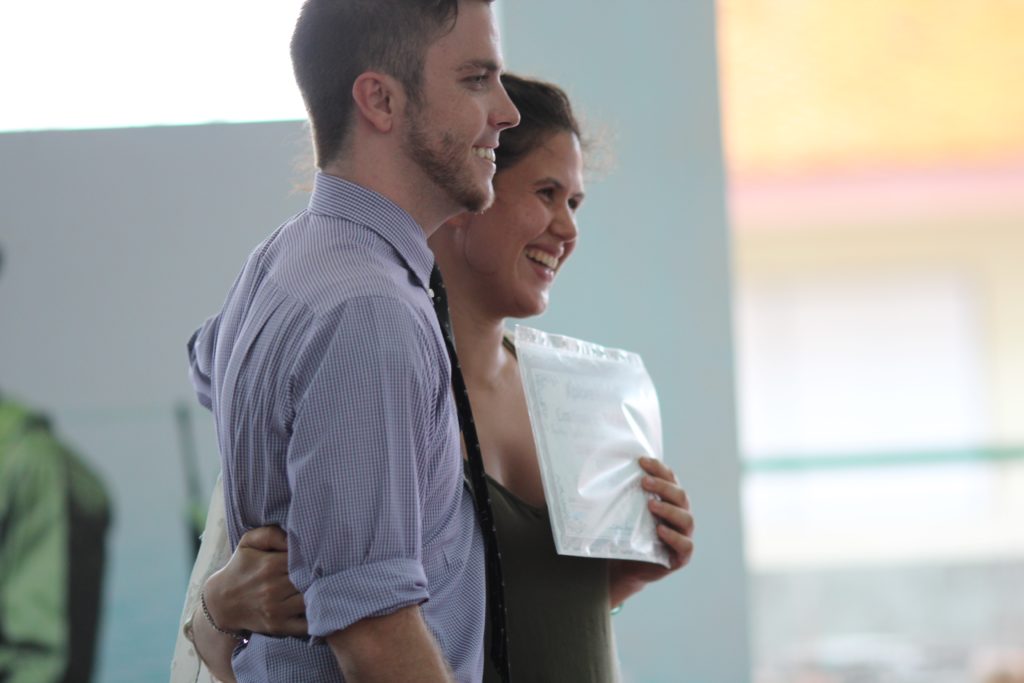
Graduation day is often the last time you’ll all be together physically. You’ll stay in touch, crash on each other’s couches and share in each other’s journeys for life though!
Keen on trying your hand at teaching English in Thailand? Or perhaps you’d just like to know more about the program and what it entails? Reach out to our programs manager for more info by clicking below:
Interested in Teaching English Abroad? We’ll send you more info!


0 Comments